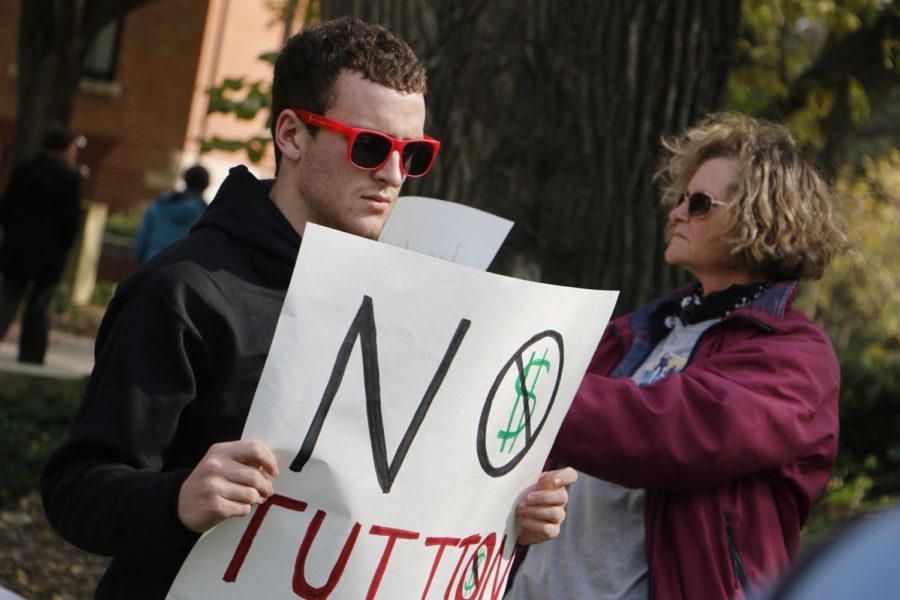Editorial: Students don’t deserve another tuition increase
Richard Martinez/Iowa State Daily
Joseph Lekowski, sophomore in horticulture, participates with a gathered crowd in front of Parks Library on Oct. 22 that rallied for action on student debt. The event was in conjunction with a similar event at the University of Iowa as the Board of Regents prepare to announce tuition policy for the coming year.
October 24, 2014
The Board of Regents met on Oct. 23 and proposed a raise on in-state tuition for Iowa’s regent universities. The past two years have seen tuition freezes for in-state students, which has been seen as a positive by many Iowans, but the University of Northern Iowa has asserted that due to the school’s high percentage of in-state students, an increase is necessary to run the university at the highest possible level of productivity.
An additional idea in support of the increase is the fact that an increase now will only result in a $116 hike per student, whereas a further postponement of an increase could result in a substantially larger rise when it inevitably occurs.
Several members of the Board of Regents argued against the increase on the grounds that Iowa’s student debt rate is already among the nation’s highest, and increasing tuition rate moves those figures in the wrong direction.
The growing concern of students is that the cost of attending college is more than the value of the education that they will receive. The stress of college level courses is enough to strain the mind of students, but when the added weight of possibly drowning in student debt upon graduation is thrown on top, many students face understandable academic struggles.
The fact that we celebrate a two-year tuition freeze indicates a startling complacency in our state’s, and on a larger scale, our nation’s commitment to making sure that young Americans can acquire the highest education available.
Many European nations subsidize the cost of a college for their citizens because they know that having an educated population is more of a societal investment than a personal one. Whereas in the United States, fewer and fewer Americans are able to afford college each generation. The current federal aid programs are an admirable initiative, but they do not get to the point of solving the problem and they become less effective each time tuitions are increased.
While enrollment at the other regent universities may not be increasing at the same rate as Iowa State University’s, there should be an overwhelming feeling of frustration among ISU students when this tuition increase is to be accompanied by an overflowing campus. Shouldn’t increased enrollment rates lead to a lower reliance on tuition money to fulfill university financial requirements?
Student frustration should also take into account the fact that Iowa State’s counseling service for helping students plan for and manage their debt was not funded due to a lack of students making appointments, meaning that this necessary service was not improved because the student body did not utilize it properly.
Thankfully, the Government of the Student Body has made the availability of one on one counseling for students in need of this service, through the new Student Loan Education Office, a priority. There will be one on one counseling, and the Financial Counseling Clinic will also be available to students.
Finally, it seems only fair that a student who decides to attend college should be able to know the cost of their education for at least the four year period in which they would be attending the schools. Why should students make such a high risk investment without knowing the actual prices they will be paying?
The student body must demand accountability, transparency and consistency from the officials responsible for deciding the cost of their education, and in extension, their future.

















